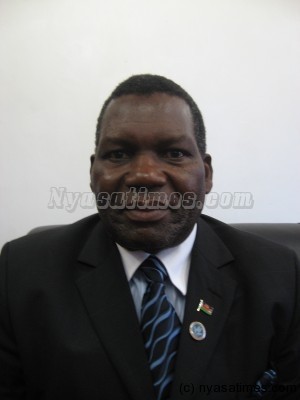Minister of Justice, George Chaponda: To table the bill in parliament
The bill also proposes to punish any idle and disorderly person and drunken persons who cause nuisances.
Those who hinder burial of dead body had better do it for the last time because once the Local Courts are instituted, they will be punished by the law.
According to the new legislative, those who pretend to tell fortunes will also be punished.
Rogues and vagabonds, those endangering or obstructing in public way or line of navigation and those in unlawful use of vehicles and animals will face the law of the Local Courts.
The bill to be presented in the forthcoming Parliament sitting seeks to introduce a new genre of courts to be named Local Courts with the primary function of dispensing familiar and affordable justice for the ordinary Malawian in line with the spirit of the Constitution which aims at enhancing the right of access to justice by all citizens.
But leader of the opposition in parliament John Tembo has said the establishment of a kangaroo like court will not ideal for a democracy.
“Its tactic and the people of this country cannot in fairness appreciate the integrity of this proposal,” Tembo told a local radio.
“I don’t think today in a multi party state we can have too parallel courts system,” he said.
Tembo said the government has some “intelligent people” who should give the voice of reason not to bring back the traditional courts which were abused in the one party dictatorship.
“We don’t agree with it. The courts system as of now is doing its best. There is nothing wrong with the present court system. So why have some kangaroo type of court come in,” he wondered on Capital FM.
Asked if the minority opposition rejection of the bill will ‘hold water’, Tembo said: “whether it will hold water or paraffin or petrol I don’t care but parliament is an institution through which opinions representing people who are represented in parliament are expressed.”
Nyasa Times has a copy of the bill and gives highlights of some of the offences.
The Local Courts will also punish any person disturbing religious assemblies, trespassing on burial places, insulting the modesty of a woman.
The courts will also punish a master who is not providing for servants or apprentices.
Those endangering safety of persons traveling by railway and those fouling water will also be punished.
The Local Courts will also handle offences of use of insulting language, conduct likely to cause a breach of the peace, common assault, unauthorised user of land and premises, writing or uttering words with intent to wound religious feelings and setting fire to crops, possession of stolen property and cheating among others.
Some of the offences that the Local Courts will handle are not relevant. The capacity of such courts is questionable. For example, how can a Local Court handle offences in relation to publications, importation of which is prohibited, publication of false news likely to cause fear and alarm to the public.
According to the bill, the Local Courts will also handle offences of carrying offensive weapons without lawful authority or reasonable excuse, fighting in public, challenging to fight a duel, deceiving witness, destroying evidence, escape and removal of property under lawful seizure.
Other offences punishable by the Local Courts include criminal trespass, dealing in poisonous substances in negligent manner, offensive trades, disobedience of statutory duty, false declaration for passport and obtaining registration by false pretence.
The proposal to introduce a new genre of courts is based on the report of a Special Law Commission on the Review of the Traditional Courts Act dated 14th September 2007.
“The Special Law Commission recognised that Magistrates courts can never replace Local Courts due to the differences in practice and procedures. Access to justice by the ordinary Malawian residing in the rural areas shall be denied if all matters including customary civil matters, continue to be handled by Magistrate Courts which are ill-equipped to handle such matters,” reads part of the bill.—(Reporting by Joseph Banda, Nyasa Times)




No comments:
Post a Comment